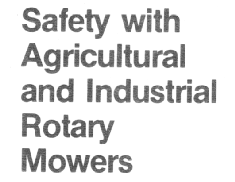
S-75

An accident with a rotary mower can cost you your life! Following safety practices, using proper equipment correctly and keeping equipment in good repair are the best accident preventives.
A rotary mower can also injure innocent bystanders, so it is important that they, too, be alert and follow safety rules.
Many accidents have happened when basic safety rules weren't followed:
These accidents, and many others, could have been prevented had safety practices been followed.
* Use the right type of mower for the job...
Know the job you are going to do, and use the correct kind of mower for it. For example, don't try to cut brush with a mower designed only for forage. You could be exposed to hazards caused by machine failure. Use heavy-duty blades where they are needed, and use a large enough machine to do the job properly. Check your operator's manual for the type of job your mower is designed to do.
* Keep others away.
Don't allow extra riders on your tractor, and keep other people out of your working area. Serious injury or death can result from falling off the tractor and being run over by the mower, the tractor wheel or being hit by a thrown object.
* Watch for objects that can be thrown by the mower. .
Watch for objects like tin cans, stones, wire or other items that could be hurled by the mower blades. These can cause serious injury.
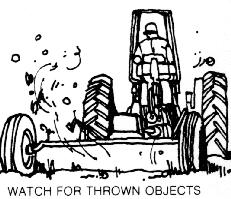
* Be alert to obstacles..
Obstacles such as ditches, rocks, and stumps can throw you off the tractor or cause a tractor upset. Be especially alert when objects may be hidden by tall grass, weeds or brush. If your tractor is equipped with roll-over protection, use the seat belt.
* Disengage pto, set brakes.
Disengage the power take-off (pto) and set the brakes before dismounting your tractor for any reason.
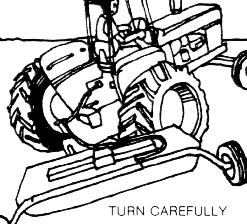
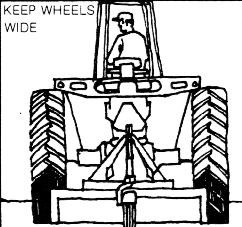
* Be sure blades are stopped ...
Many rotary mowers have blades that continue to rotate for some time after the pto is disengaged. Be sure they have stopped turning before approaching the mower.
* Be careful when turning sharp corners...
On pull-type mowers, the rear tractor wheels could catch the mower frame and throw it toward you. With three- point-hitch mounted mowers, the mower swings outward when you make a turn. Front wheel weights may be needed to help you keep control.
Before operating your mower, familiarize yourself with its maintenance procedures. Study your operator's manual carefully.
Begin your pre-operational check by making sure the power take-off is disengaged and the engine is shut off. Look for loose nuts and bolts.
Blade sharpness is a key to efficient mowing. Inspect the blades often, and when they become too dull for additional sharpening, replace them. Dull blades can be dangerous. because mowing will be more difficult. Hazards increase when you are having problems with the equipment.
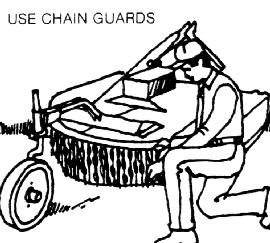
Rotary mowers are often equipped with runners and safety chain guards. To avoid excessive wear on the runners, keep the mower just high enough so that it doesn't ride on the runner shoes.
The chain guards reduce the possibility of objects being thrown from under the mower. Be sure chain guards are maintained and kept in place. If you must remove them or raise them for certain crops, be sure to replace or readjust them as soon as you are finished.
Power transmission shafts should be protected by shields or guards. Keep them in place on the machine. Always replace shields and guards after maintenance or repair jobs are complete.
A Federal child labor law affects you. Unless you are working for your parent or guardian on a farm owned or operated by that person, you may not operate a tractor over 20 pto hp and certain other farm machinery. You may do so at age 14, if you have special training.
Young people under 14 may be employed to do any job that is not classified as particularly hazardous if they have the written consent of their parent or guardian. There is one exception: those under 12 are not permitted to work on farms that used 500 or more man-days of farm labor during any quarter of the preceding calendar year. Check with your county Extension office for full details.
Prepared by David H. Loewer, former Purdue staff member in Agricultural Engineering
Approved for reprinting by Bill Field, Extension Safety Specialist
For more information, contact Bill Field, Agricultural and Biological Engineering, phone: 317-494-1191 or e-mail: field@ecn.purdue.edu
RR 7/90
Cooperative Extension work in Agriculture and Home Economics, state of Indiana, Purdue University, and U.S. Department of Agriculture cooperating; HA. Wadsworth, Director, West Lafayette. IN. Issued in furtherance of the acts of May 8 and June 30, 1914. Purdue University Cooperative Extension Service is an equal opportunity/equal access institution